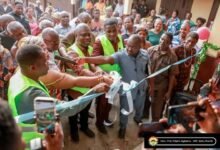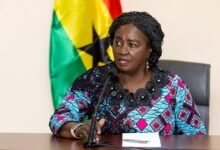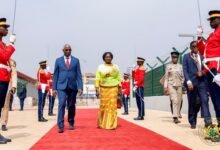36 medical herbalists inducted

Thirty-six medical herbalists were yesterday inducted into the Traditional Medicine Practice Council to augment alternative healthcare delivery in the country.
The inductees were three combined batches of graduates in herbal medicine from the Kwame Nkrumah University of Science and Technology (KNUST).
Addressing the induction ceremony in Accra yesterday, on the theme; “Government policy on digitalisation in the promotion of traditional medicine,” Deputy Minister of Health, Tina Naa Ayeley Mensah, said efforts by successive governments to integrate traditional medicine into the mainstream health system was indicative of the importance it attached to making the area a viable option.
“The addition of medical herbalists to our healthcare system especially in the delivery of primary healthcare is a major boost as we strive to attain Sustainable Development Goal, three, universal health coverage including financial risk protection, access to quality essential healthcare services and access to safe, effective, quality and affordable essential medicines and vaccines for all.”
Ms Mensah commended KNUST which had been a major training ground for medical herbalists in the country, and other key stakeholder institutions for working assiduously over the years to ensure standardised and formalised traditional medical practice in Ghana.
She said, complementary to the government’s interventions like the introduction of the Ghana Card, Ghana Post addressing system among others, regulation of the traditional medical practice would improve and “practitioners registered with the TMPC will be well traced and can no longer hide in the dark operating to the detriment of unsuspecting Ghanaians.”
The deputy minister charged the inductees to conduct themselves worthy of increasing public trust in the profession as they entered the field of work.
“The reputation of the practice lies on your shoulders. How you conduct yourself will reflect on all of us. Go out there with courage and make the profession and nation proud,” she advised.
Acting Registrar of the Council, Dr Mrs Anastasia Yirenkyi, stressed the importance of traditional medicine to advancing quality healthcare delivery in the country.
She said, currently, there were 55 government hospitals across the country operating herbal units and providing herbal medicine services to patients who preferred that option.
Dr Yirenkyi urged the government to sustain efforts at developing traditional medicineto the level where people seeking healthcare would have the option of conventional medicine or herbal medicine to meet their health needs.
“Over the last 20 years, the government has made significant progress in developing traditional medicine as a viable healthcare option but a lot needs to be done in order to achieve health for all at all ages in line with the SDG goal three,” she stated.
The Acting Registrar implored the graduates to apply themselves to constant studying, avail themselves for mentorship, pay attention, show resilience and exhibit the transformative abilities raise the image of the practice.
Former Director of Healthcare Services at the West African Health Organisation (WAHO), Dr Kofi Busia, called on the government to, as a matter of urgency, consider enrolling some herbal products unto the National Health Insurance Scheme as demand for that field of medicine increased among the population.
To the newly qualified practitioners, he charged them to be cautious of medical negligence in their line of duty and “be agents of change in the digital ecosystem by learning, listening and empowering others.”
BY ABIGAIL ANNOH








